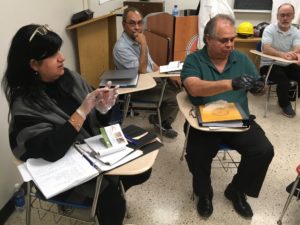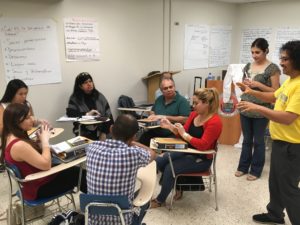February 5, 2018
ICWUC Leads Effort to Help Workers in Puerto Rico
 On Jan. 22 to 28, the ICWUC led a team of senior trainers and worker educators at the Universidad de Puerto Rico in San Juan to help protect workers on the island from preventable illnesses, injuries and possible fatalities in the aftermath of Hurricane Maria.
On Jan. 22 to 28, the ICWUC led a team of senior trainers and worker educators at the Universidad de Puerto Rico in San Juan to help protect workers on the island from preventable illnesses, injuries and possible fatalities in the aftermath of Hurricane Maria.
Four months after Hurricane Maria hit Puerto Rico, millions of island residents still face daily threats to their safety and health. More than two million people live in areas at risk of water contamination, large parts of the island are still without electricity, and 60,000 homes are without roofs.
The week-long “Disaster Train-the-Trainers” event was presented in Spanish with the goal of developing trainers to protect day laborers, construction workers, and others who are at risk of exposure to mold, toxic chemicals, damaged buildings and other hazards.
Trainers from Fe Y Justicia Worker Center in Houston, the Massachusetts Coalition for Occupational Safety and Health (MassCOSH), the New York Committee for Occupational Safety and Health (NYCOSH), the American Federation of State, County and Municipal Employees (AFSCME), the Labor Council for Latin American Advancement (LCLAA) and the Cincinnati-based ICWUC Center conducted in-depth sessions with graduate students in public health from the Universidad de Puerto Rico, as well as AFSCME members from the Commonwealth of Puerto Rico.
 “This program is possible now because we’ve already conducted Spanish-language “Disaster Train the Trainer” events with our partners,” said Luis Vazquez, an education coordinator at ICWUC, who coordinated and conducted the San Juan program to train students and workers. “The work we’re doing in disaster areas makes a real difference, giving workers the tools they need to stay safe. This event is personal for me; I have many family and friends in Puerto Rico. There are all kinds of dangers lurking in homes and buildings after a hurricane.”
“This program is possible now because we’ve already conducted Spanish-language “Disaster Train the Trainer” events with our partners,” said Luis Vazquez, an education coordinator at ICWUC, who coordinated and conducted the San Juan program to train students and workers. “The work we’re doing in disaster areas makes a real difference, giving workers the tools they need to stay safe. This event is personal for me; I have many family and friends in Puerto Rico. There are all kinds of dangers lurking in homes and buildings after a hurricane.”
Topics at the training included how to recognize disaster-related workplace hazards, safe clean up procedures and workers’ rights to a safe workplace. New trainers practiced these modules and presented them to their fellow new trainers. These graduate students and workers, in turn, will soon be out in the field to share this information at temporary shelters, recovery worksites, and other locations where workers are affected by hazards associated with disaster recovery.
This “Train-the-Trainers” session builds on similar programs conducted by the ICWUC in Cincinnati with many of their 10 partners, and with National COSH in Houston last September after Hurricane Harvey devastated that city. The training was made possible, in part, by support from the U.S. National Institute of Environmental and Health Sciences. For more information, contact John Morawetz of the ICWUC’s Center for Worker Health & Safety Education at jmorawetz@icwuc.org.